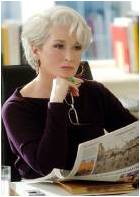 By all means move at a glacial pace. You know how that thrills me. ~ Miranda Priestly (Meryl Streep) in The Devil Wears Prada
By all means move at a glacial pace. You know how that thrills me. ~ Miranda Priestly (Meryl Streep) in The Devil Wears Prada
Meryl Streep’s Miranda Priestly in The Devil Wears Prada is a fine caricature of the influential New York editor: powerful, determined, unforgiving, and visionary. She sits atop a multibillion dollar industry and no one dare question her editorial direction (to do so might result in a banning from Jimmy Choo’s). Priestly’s romanticized professional existence is punctuated by a front row seat at fashion week, attentive assistants and chauffeurs, and unquestioning staff who serve only her interests.
The reality of a career in the publishing world is obviously quite different than the dysfunction presented in The Devil Wears Prada. Publishing is a complex industry that requires diverse talents and perspectives and demands collaboration. Many people with varied specialties contribute to a successful publication: writers, photographers, digital artists, web designers, and an array of editors are responsible for the creation, revision, and eventual publication of print and online material. It is the editors of a publication who decide on tone, layout, content, direction, and correctness of the writing and images that go to press.
A career in editing is an exciting way to put the breadth of knowledge acquired at Puget Sound into words that last forever. There are as many fields to apply editing skills to as there are roles as editors. Whether you want to work in traditional publishing (book, magazine, or newspaper) or use your skills in public relations, advertising, or new media, you will find multiple pathways. For example, here are some examples of the various editors required to seamlessly produce a fashion magazine that is runway ready:
Copy Editor: Prepare your punctuation prowess and sharpen your sentence structure senses: copy editors ensure that writing is clear, cohesive, and correct. These editors proofread for grammar, usage, and mechanics (remember GUM from grade school?). They also provide feedback on flow, readability, compliance with editorial direction, and comprehension.
Online Editor: HTML might not stand for “Hurry To Make (it) Live” but online editors have to work quickly to clear content for online delivery. The intense speed of online publishing, especially online news, demands editors to work quickly to ensure accuracy while getting content posted fast (practically yesterday!).
Photo Editor: Who ensures that a story about a Chicken Pox outbreak is not juxtaposed by a photo of a chicken coop? Photo editors help bring writers and photographers together to create the total package. The photo editor discusses the content and angle of stories with writers and photographers and selects the best images to enhance the written word.
Managing Editor: A publication whose writers only write about one topic wouldn’t garner many readers. The managing editor coordinates department editors and writers to ensure that the scope of the publication’s topical areas is covered. Managing editors typically oversee the daily operations of a publication and coordinate the hiring and training of staff writers, fact checkers, and editorial assistants.
Executive Editor: Also called “Editor-in-Chief,” the person in this role defines the editorial direction of a publication. What content is important? What do readers want to read? What advertisers will want to place their ad next to our features section? Executive editors also manage staff, assign responsibilities, manage a budget, assist with story generation, attend industry events, meet with advertisers, and give the final stamp of approval on all editorial decisions.
Puget Sound students who can write well, communicate clearly, have an eye for errors, and totally grok the lexicon could consider a career as an editor. Get started by working for The Trail, blogging online, submitting articles to print and online publications, interning with a publishing house or website, or looking for a part-time job that builds your communication skills. Career and Employment Services offers a number of resources to help students get started.
Career Cruising (accessible via CES’ career resources) provides profiles for careers related to editing and publishing.
The Alumni Sharing Knowledge (ASK) Network on LinkedIn lists alumni who work in various capacities who are eager to hear from Puget Sound students to help you learn more about your career development. Search for the job title “Editor” and you’ll find a number of alumni to talk to. For example:
- Ethan is an Assistant Editor for South Sound Magazine
- Aimee is a Technical Editor for Microsoft
- Kirsten is a Web Editor for the Chicago Sun Times
Plus more than 20 others!
Books Available for Checkout in the CES Career Resource Library (Howarth 101)
- Career Opportunities in Writing
- Careers for Writers and Others Who Have a Way with Words
- Career Opportunities in Publishing
- Careers for Perfectionists
Web Resources
American Copy Editors Society (ACES)
National Association of Independent Writers and Editors
Bureau of Labor Statistics: Authors, Writers, Editors
© 2011 Career and Employment Services, University of Puget Sound